Mirasvit Latest Updates — November 2025
-
 Andriy Kovalenko
Andriy Kovalenko
- Our News & Updates
- Nov 3, 2025
- 13 min read
This month, we prepared module updates that strengthen content automation and localization, improve search and catalog navigation, and expand compatibility while increasing technical reliability.
We significantly refined the GPT AI Assistant & Content Generator extension: the interface and settings were rethought, alternative AI providers and system messages were added, the generation context was expanded, and automation, performance, and stability were increased. As a result, there is less manual work, faster rollout, and more accurate texts for each store view.
Magento 2 Layered Navigation extension now includes a Filters Manager: the tool centralizes control over filter behavior and placement, supports quick movement between blocks, and provides a visual preview without developer involvement. This makes catalog navigation clearer and shortens the path to the right product.
In the Elasticsearch Ultimate module, we focused on relevance and administration workflows: targeted reindex of individual products speeds up troubleshooting, a configurable request size improves the accuracy of the category filter, and better matching of child product values yields cleaner results.
Below, we detail these changes and how to use them.
Table of Contents
- GPT AI Assistant & Content Generator
- Layered Navigation
- Extended Shopping Cart Rules
- Elasticsearch Ultimate
- Blog MX
- Customer Segmentation Suite
- Full Page Cache Warmer
- Advanced Reviews
- Product Kits
- Follow Up Email
GPT AI Assistant & Content Generator
This month, the GPT AI Assistant & Content Generator module was the clear leader by number of updates. Our developers worked across multiple aspects, from the UI to adding new capabilities.
An important change is the addition of a dedicated section with global provider and model settings at Stores > Configuration > Mirasvit Extensions > Developer > AI Configuration. You can now configure them in one place and use those settings across our extensions that support AI features.
Additionally, the ability to override the provider or model at the extension level has been preserved, so you can solve content-generation tasks as efficiently as possible.
🔥 Support for AI providers Anthropic Claude and Google Gemini
The module can now work with Claude and Gemini alongside GPT, giving you more options for content generation. You gain flexibility in choosing an AI service to match your tasks, budget, or preferred response style.
Integrations with Claude and Gemini provide access to advanced language models, improving the quality and variety of generated text.
🔥 Prompt editor field grouping and clearer controls
The AI Assistant panel in the Magento admin has become even clearer and easier to use. Our specialists reworked the design and controls.
For example, on the Prompt page, all fields are grouped by purpose, making them easier to work with.
🔥 AI providers comparison block
You can now easily compare AI services connected for different modules: the block clearly shows providers (OpenAI, Anthropic Claude, Google Gemini, etc.), with key information about each.
This simplifies choosing an AI model for your tasks and speeds up onboarding, since all necessary details are immediately visible.
🔥 System messages library for prompts
A new section, System > AI Assistant > System messages, lets you add an unlimited number of instructions and use one of them when configuring a prompt, defining the model's desired style or context.
This helps shorten prompts and avoid repeating general requirements in every prompt.
A system message complements the AI prompt. For example, you can require a formal tone or adherence to your brand guidelines.
As a result, AI texts more precisely match your store's requirements, since the model follows your instructions in all prompts where the message is applied.
🔥 Regex-based overrides in automation rules
Automation rules have gained support for regular expressions. You can specify a pattern so a field value is overwritten only when the source text matches it.
This gives you finer control: update or generate content only for empty fields or specific phrases without affecting existing high-quality text. It helps prevent accidental changes and reduces time spent on manual review.
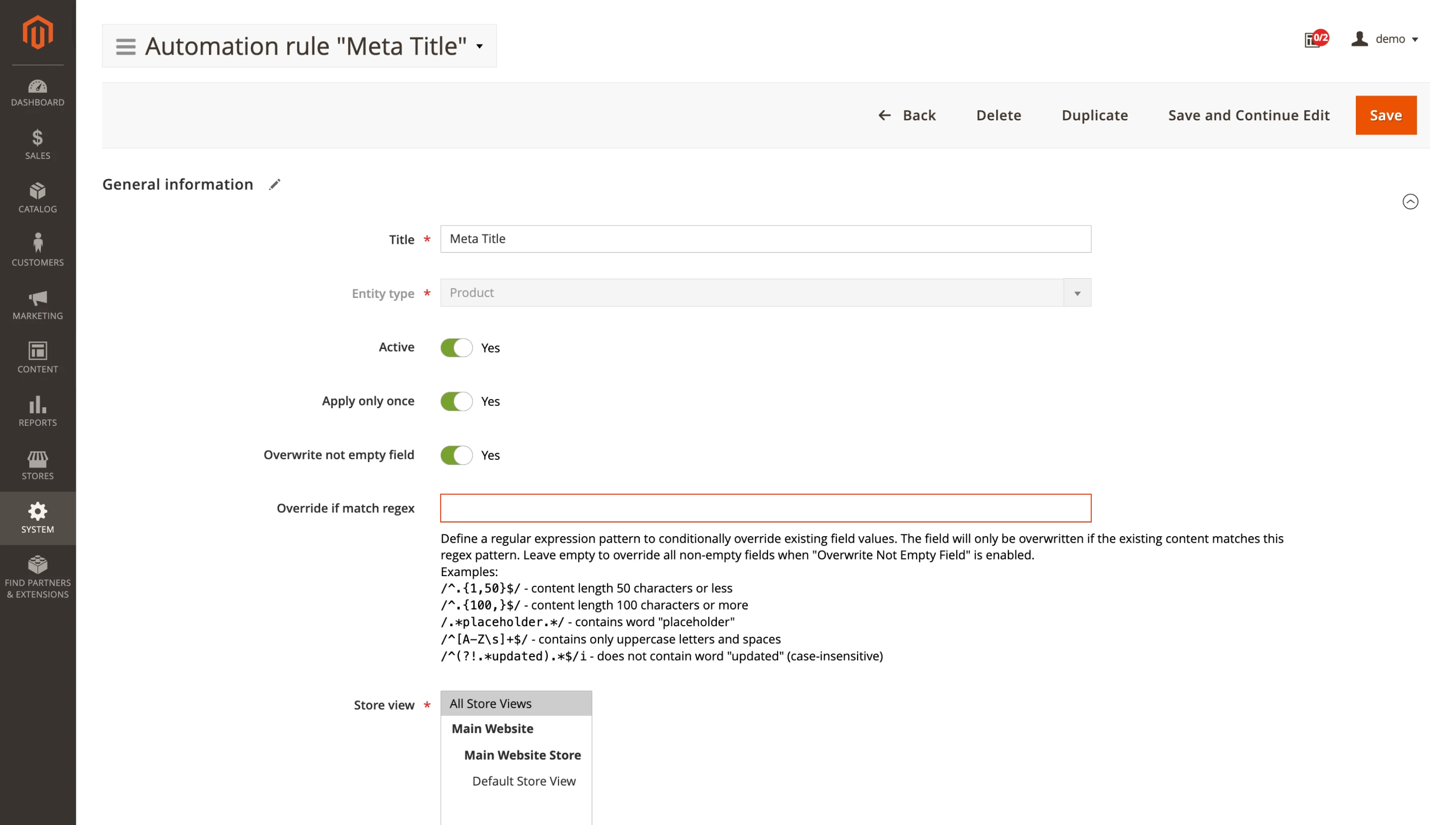
Special condition: to use regex, first enable Overwrite not empty field in the automation rule.
🔥 Category context with parent attributes and first 10 products
Take into account data from the parent category's attributes and retrieve information about the first ten products from that category when generating text. This makes category descriptions more relevant: the AI understands the category's position within the catalog structure and the assortment inside it.
The generated content becomes more informative, naturally includes product names and related keywords, which improves SEO and helps your customers navigate more easily.
You can access the data using variables such as {category.products} and {category.parent.attribute_code}.
Note that
{category.products}returns an array of products and requires iteration.
Here is an example prompt for using data about three products from the category:
{% if category.products and category.products.size > 0 %}
Products in this category:
{% for product in category.products limit: 3 %}
- { product.name } ({ product.short_description })
{% endfor %}
{% endif %}
🔥 Blog categories compatibility (Mirasvit Blog MX)
Support for blog categories has appeared in the new version of the extension. Generating and editing blog category descriptions with AI works as smoothly as it does for catalog categories.
You can confidently use AI to manage blog content without technical issues.
🔥 Blog content automation rules (Mirasvit Blog MX)
Use automation rules not only to generate product and catalog category content, but also blog content.
Templates produce texts for blog posts and category descriptions. This speeds up content creation: AI suggests ideas, outlines, and drafts, maintains a consistent style, and saves the content team time.
🔥 Store context in automation rules
If you run a rule for a specific store view, AI now uses that store's data: language, currency, name, etc. This is important for multi-store sites in different languages, because content is generated with each store view's local settings without mixing data.
You can be confident that AI Assistant creates texts that fit each store view, improving localization and accuracy.
Use the {store.locale} variable, which returns the target Store View's locale label (e.g., English (United States), German (Germany), French (France)).
The store context always comes from the target Store where the prompt runs, regardless of Get Variables' Values From.
This lets you keep one universal prompt that translates into each Store's locale. In Automation Rules, select specific Store Views.
🔥 Database data type optimization
Our developers reviewed the storage format for generated content and other data, making it more efficient. This improves performance and reliability: the module processes requests faster and handles larger volumes of information better.
Although nothing has changed visually for you, AI Assistant will run more stably and faster, especially as the amount of content grows.
🔥 AI request latency, stability, and error handling improvements
Response time has been reduced and generation stability improved, especially when using unstable or new AI providers. Error handling has also improved.
Layered Navigation
🔥 Filters Manager with placement and behavior control
In the latest update of the Magento 2 Layered Navigation extension, a convenient Filters Manager panel has appeared.
It lets you not only configure how filters look and work on the storefront, but also quickly move them between the sidebar and the horizontal bar with simple drag-and-drop.
You can:
- Add required attributes to filters right from the interface, without code.
- Configure their behavior (for example, whether to show attributes with no results).
- Control the display order and appearance of each filter.
- Place filters in blocks, either in the left sidebar or horizontally above the products, and see the result instantly.
This is especially useful for optimizing the shopping experience: you can keep key filters (for example, price, brand) in view, and move secondary ones to the sidebar.
All management happens at Content > Layered Navigation > Filters Manager, with a clear, visual workflow.
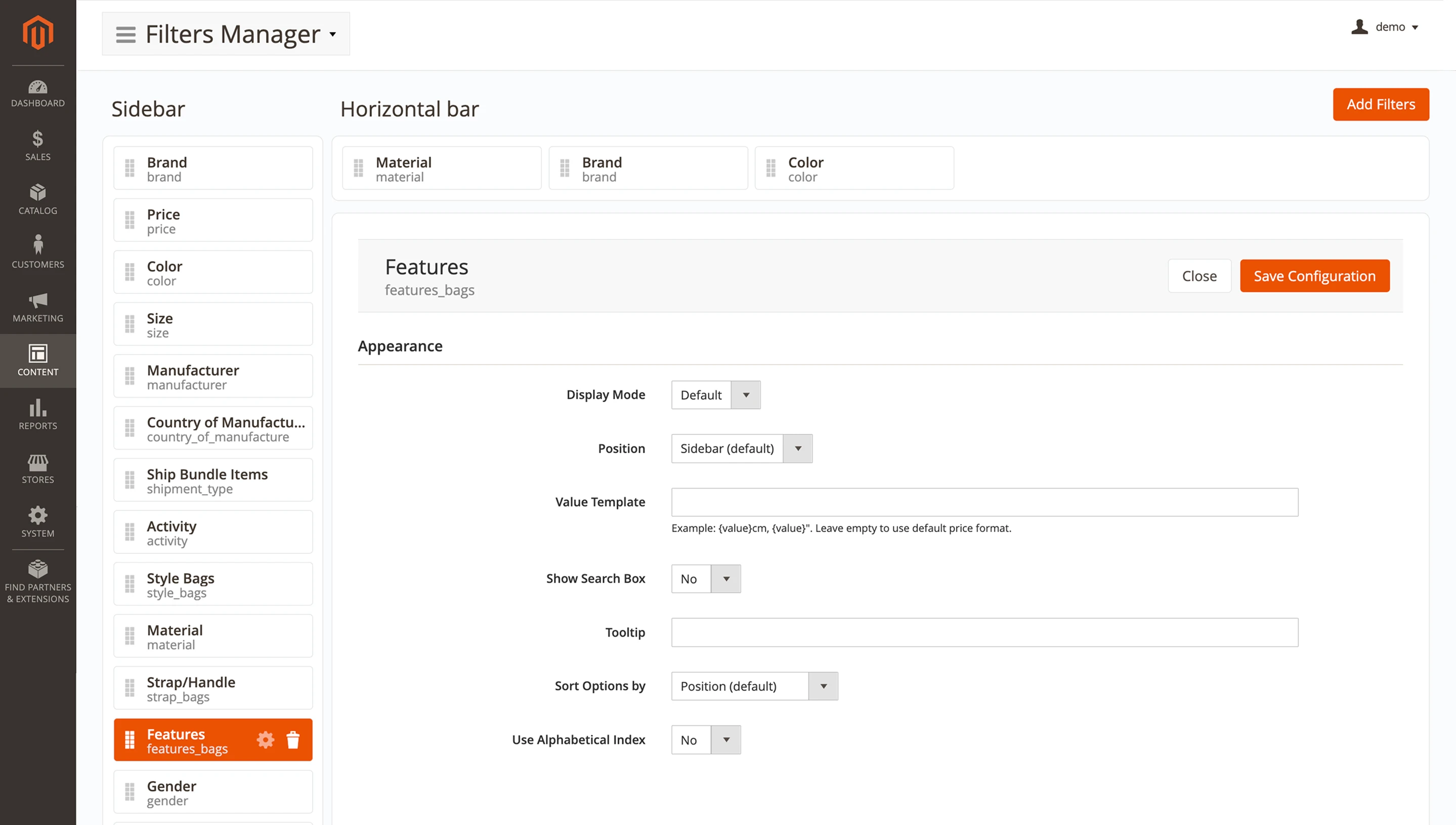
If configuring filters used to be inconvenient, it now takes just a couple of minutes, and no developers are required.
Extended Shopping Cart Rules
🔥 Tax-inclusive calculation in 'For each $X spend, give $Y discount' rule
The Extended Shopping Cart Rules module's functionality has been enhanced.
Magento 2 stores product prices in the database, excluding tax. Depending on your store settings, the storefront can display prices including or excluding tax (configured in Stores > Configuration > Sales > Tax).
The For each $X spend, give $Y discount rule calculates the discount with tax included when prices are shown including tax. The discount amount is computed correctly with all applicable taxes considered.
This is especially useful for B2C stores where storefront prices include tax (for example, VAT). You can run spend-and-save promotions with confidence, and shoppers see clear, consistent totals.
Overall, promotions become clearer for customers, and managing discounts becomes easier.
Elasticsearch Ultimate
Our specialists have prepared four new features for the Elasticsearch Ultimate extension.
🔥 CLI reindex by product ID
The module has its own CLI reindex command that lets you choose the index type or store to reindex. The command now also supports reindexing a single product by specifying its ID.
This is useful when debugging or configuring a product, or when you need to apply changes quickly and a full catalog reindex would take too long.
To use this feature, update the extension and run the console command with the --one-product parameter:
php bin/magento mirasvit:search:reindex --one-product=7
(where 7 is the product ID).
🔥 SecondBlog search index (Magefan Multi Blog)
You can now search not only across Magefan Blog, but also across SecondBlog (part of the Magefan Multi Blog extension), which expands your ability to find the right information in your store.
How to use:
- Update the module and set up a separate search index: System > Search Management > Search Indexes, then click Add New Index.
- In the Type field, select Magefan > Second Blog, and complete the index setup (set searchable attributes, title, position, etc.).
- Run a reindex.
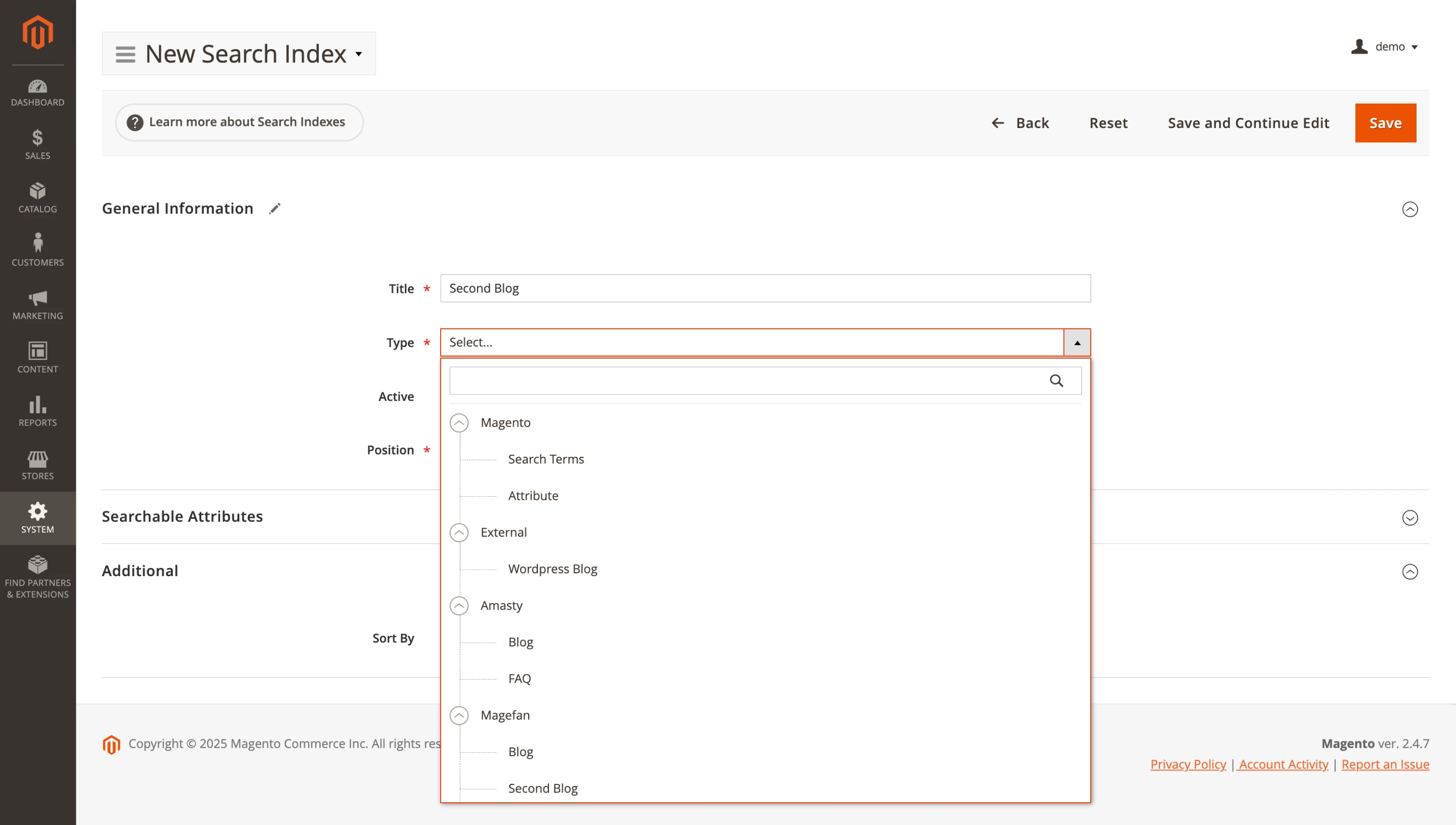
🔥 Configurable request size in category filter
Search Ultimate supports filtering search results by category. Magento's default request size is 1,000, and when a search term returns more than 1,000 results, not all of them are used in the category filter, which affects accuracy.
We have extended the module's capabilities, so this platform default is no longer a constraint. You can now change the request size and get more accurate category-filter results.
Configure this in Stores > Configuration > Mirasvit Extensions > Search ultimate > Search results and display > Search refinements and visibility > Search request size limit.
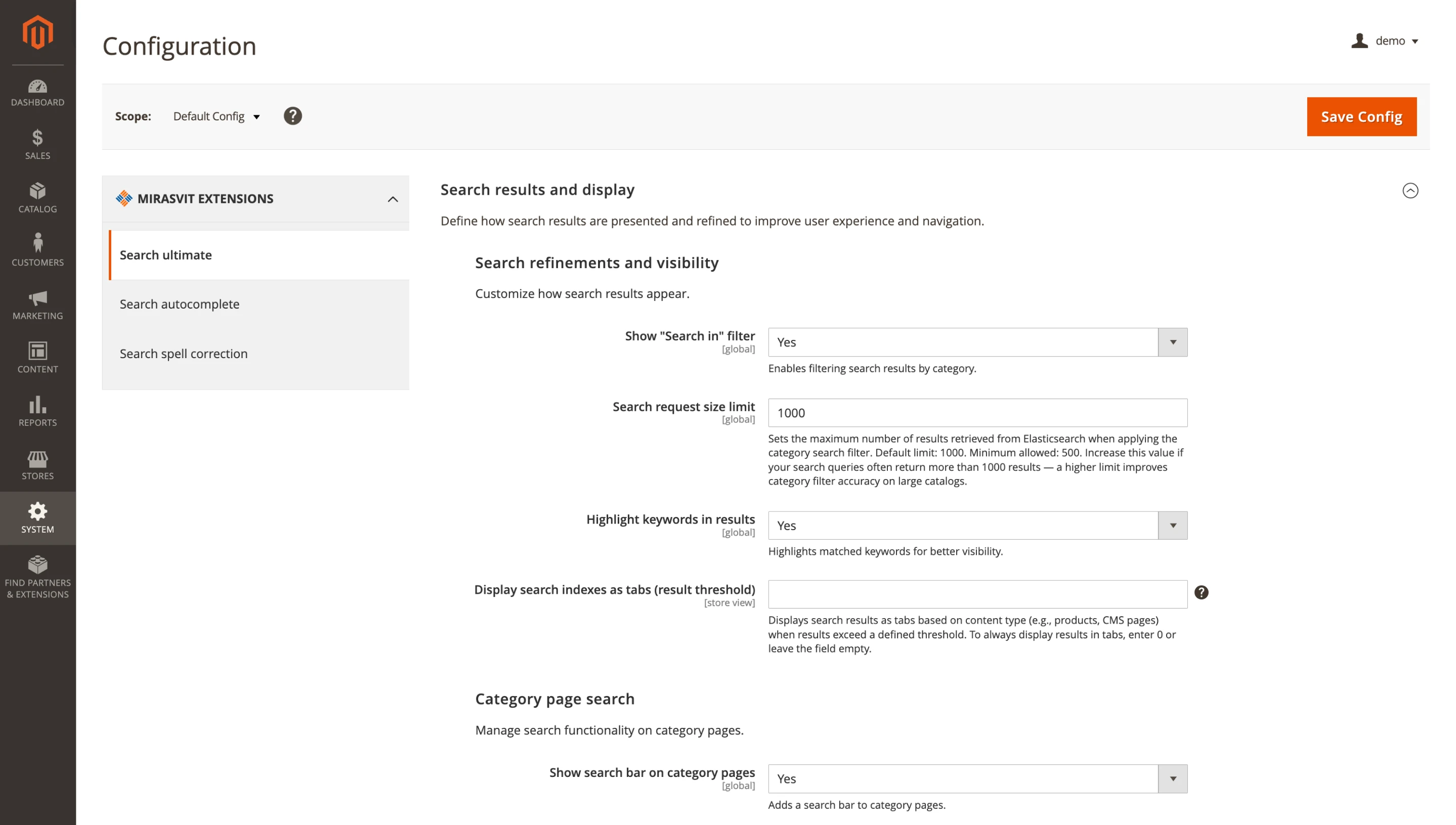
🔥 Long-tail matching for child product attributes
In the new version of the module, you get expanded long-tail search capabilities for custom attribute values in child products.
This is useful for configurable or grouped products that have sets of child products with different values for certain characteristics—for example, labeling—where a customer may search for ABC 123 or ABC123. The improvement returns results in both cases.
To activate, enable Search by child products in the Products index settings.
Blog MX
🔥 Post 'Updated At' column and Hyva CMS compatibility
In previous versions of the Magento 2 Blog MX extension, blog posts had only a creation date Created At, which made it harder to see when an article was last updated.
After the update, the admin shows a last edited date (Updated At) for each post, so it is easy to assess freshness even for older articles.
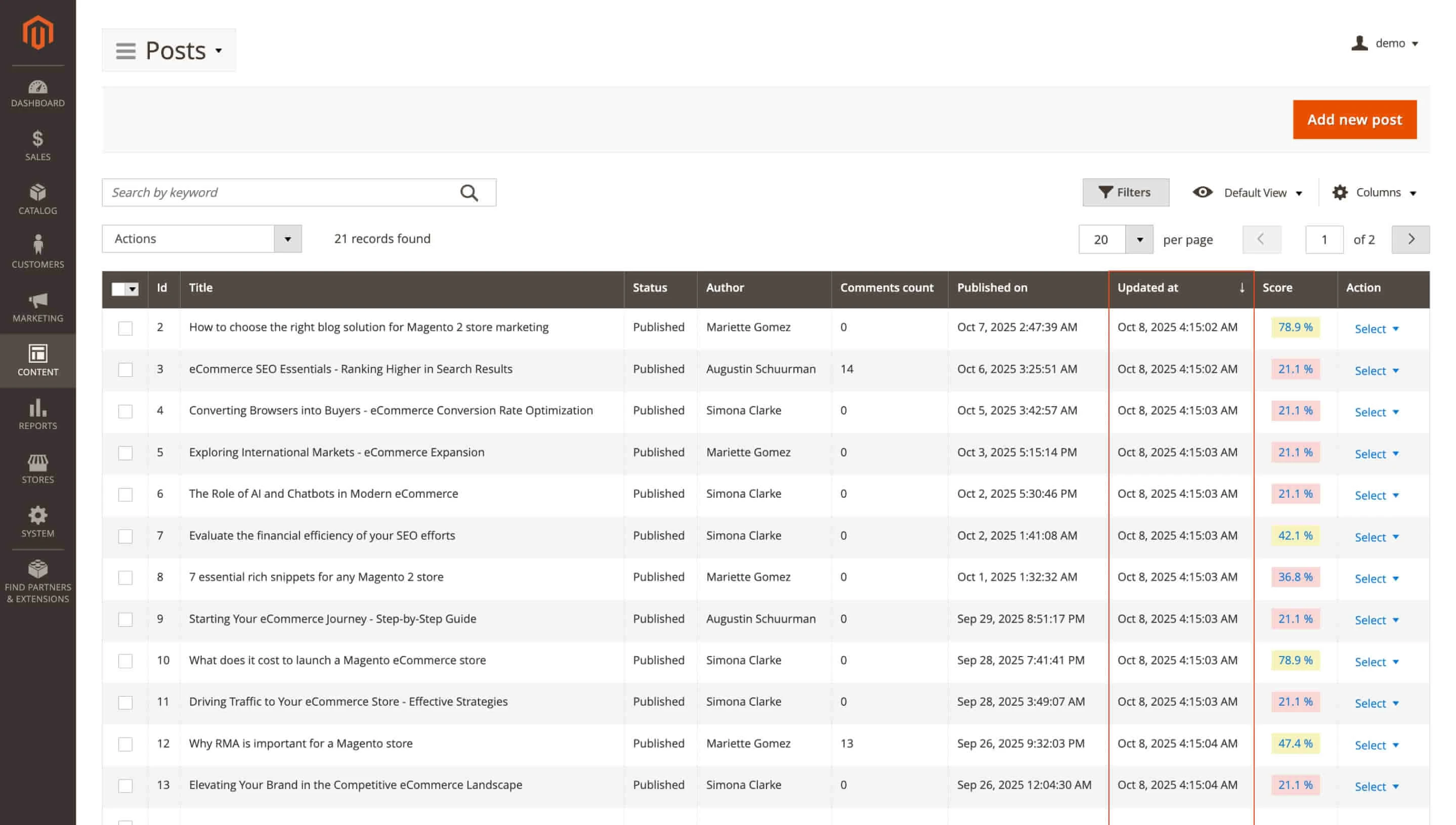
It's very easy to use this feature: go to Content > Blog > Posts, then enable the Updated At column.
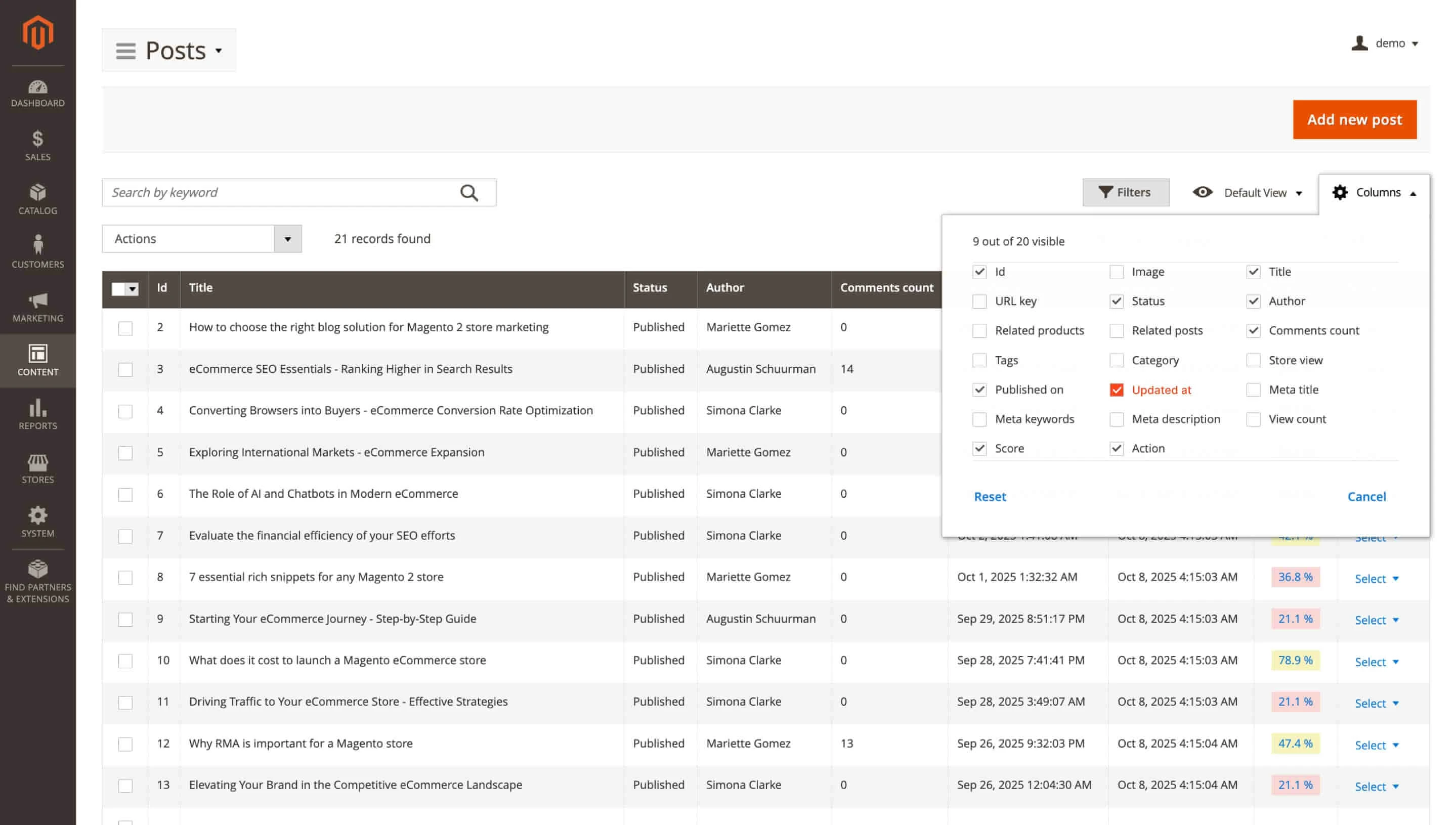
Additionally, our developers have added Hyva CMS compatibility to the extension, ensuring correct blog rendering and streamlining work on projects that use this ecosystem.
Customer Segmentation Suite
🔥 'Days Ago' purchase recency condition
In the Customer Segmentation Suite extension, a new condition, Product was purchased X days ago, has been added. It lets you build segments based on the time since a customer last purchased a specific product, a category, or any other combination of conditions.
Target offers, email campaigns, and personalization more precisely. For example, show a repeat-purchase reminder 30 days after the last order, or suggest accessories 7 days after the main purchase.
The condition works with all other segmentation filters and requires no additional setup. Simply choose the number of days in the admin, and the system will determine who belongs to the segment.
🔥 Segment refresh interval reduction
Segments are recalculated more frequently and with higher accuracy. We have reduced the minimum interval between recalculations and optimized the data update process. As a result, segments remain up to date even with a large customer base.
This is especially important for automated actions, campaign launches, and personalized blocks, where segment membership affects content visibility in real time.
Full Page Cache Warmer
🔥 Content Security Policy (CSP) compatibility
Magento 2 Full Page Cache Warmer extension also received attention this month.
Some themes and extensions use inline scripts or third-party resources that can violate Magento's Content Security Policy (CSP). This can trigger warnings or errors in the browser console, break JS functionality, and make pages non-cacheable.
CSP compatibility ensures that pages are warmed and cached correctly. Update the module to the latest version to get it.
Advanced Reviews
🔥 Review reminder settings per store view
Previously, in the Advanced Reviews module, reminder delivery could be configured only for the default store. After the update, review reminder settings are available per store view.
For example, for different stores you can set different senders, anchors on the product page, email templates, and customer groups, or disable reminders entirely.
Product Kits
🔥 Not Visible Individually items in kits
In previous versions of the Product Kits extension, only products visible in the catalog (Catalog/Search) could be added to kits. Simple products with Not Visible Individually visibility were not supported.
After the update, these items are supported as well, including simple variants of configurable products. This lets you build unique kits from products that are not shown separately in the catalog.
To enable the feature, go to Stores > Configuration > Mirasvit Extensions > Product Kit > General Settings. Find the Allow Not Visible Individually items for kit option and set it to Yes. Then save your changes.
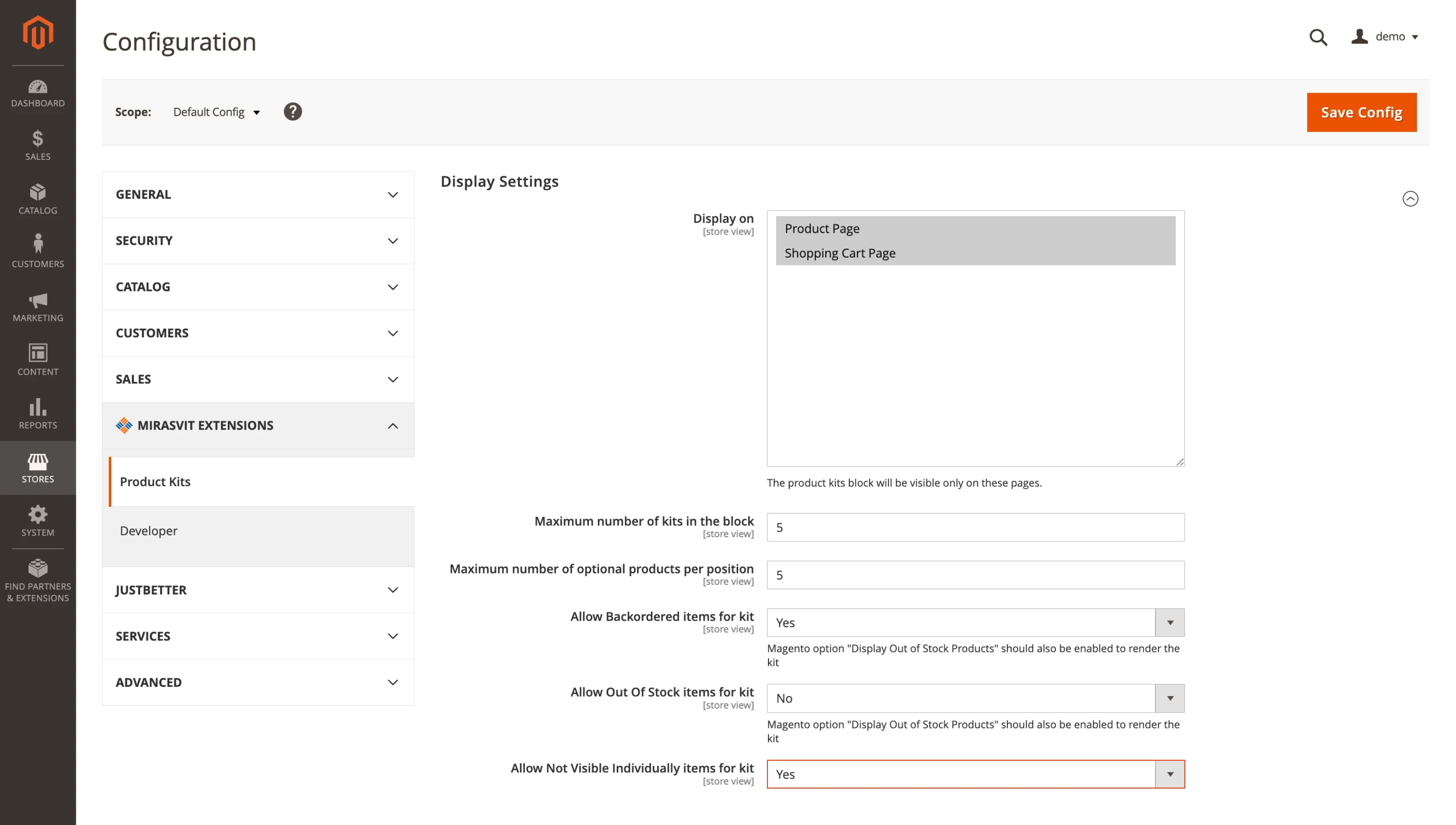
Follow Up Email
Our specialists have also prepared several improvements for the Magento 2 Follow Up Email extension.
🔥 Customer Segment event triggers
In this update, a trigger based on customer segmentation events has been added: a campaign starts the moment a shopper is assigned to the selected segment. Integration with the Customer Segmentation module now works at the event level.
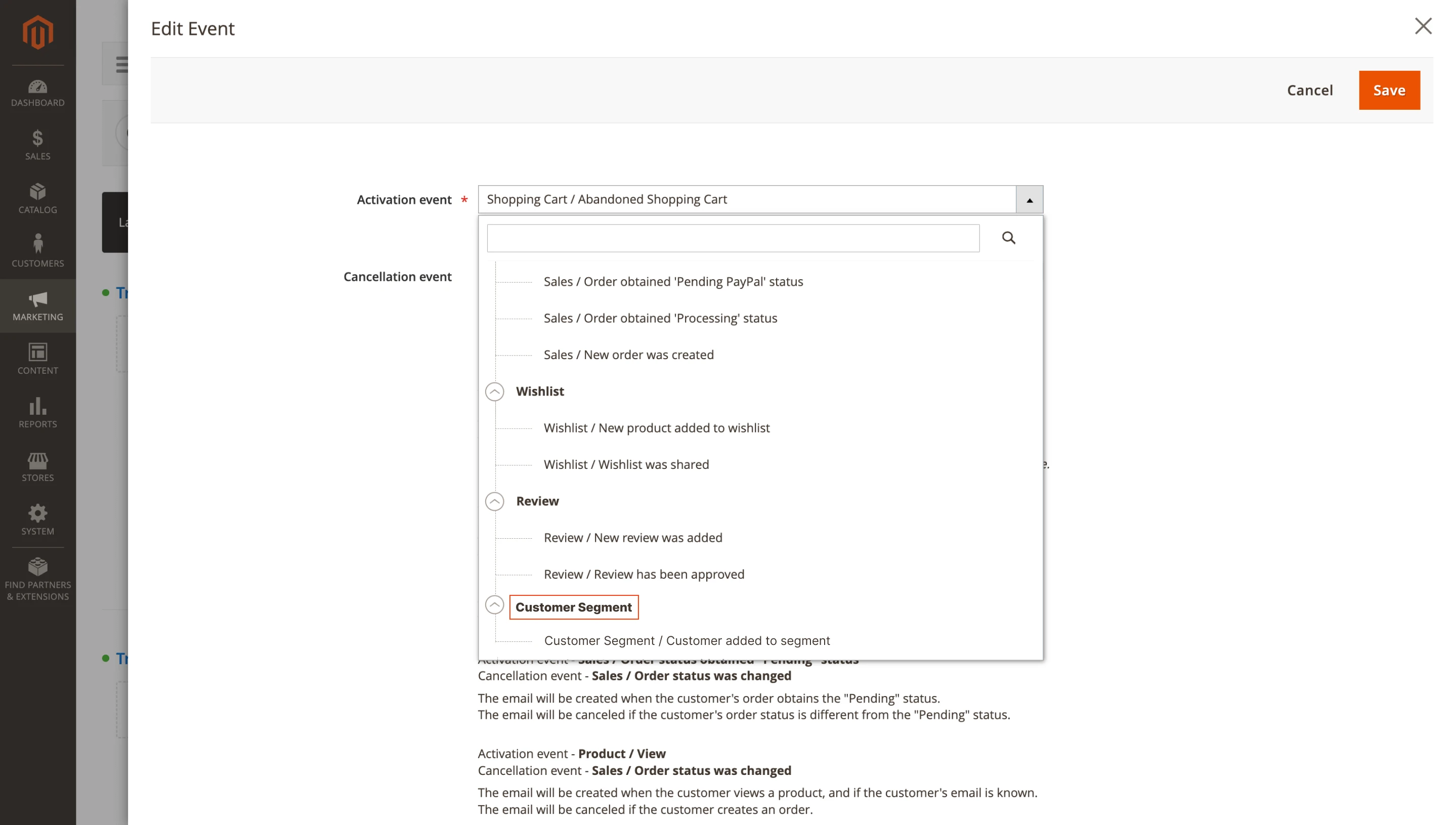
Use the new capability by configuring the following settings:
- Go to the desired campaign: Marketing > Manage campaigns > View campaign.
- Open the event settings: Event > Edit.
- In the Activation event field, in the Customer Segment section, select the needed event.
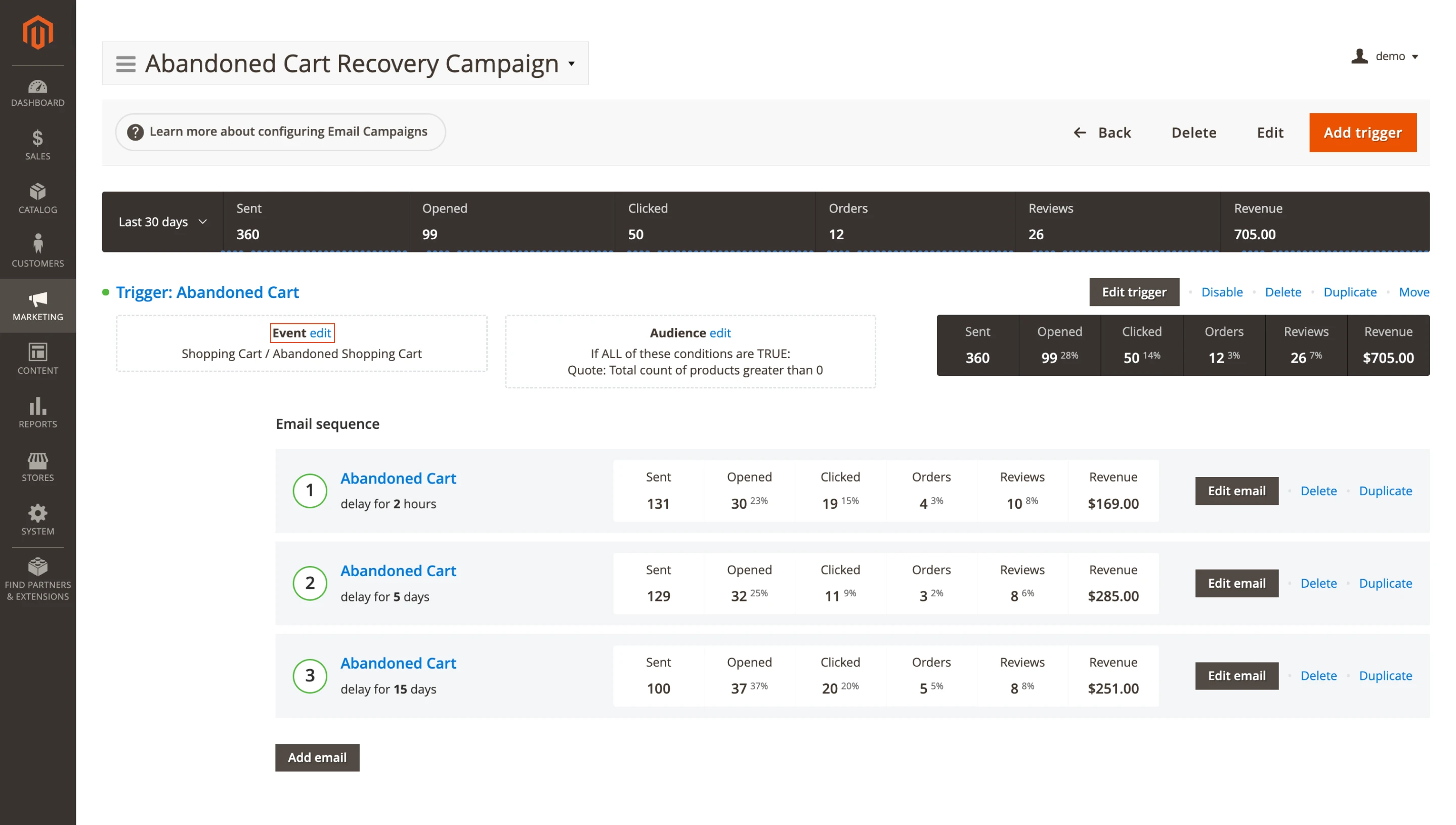
Special conditions: update the Follow Up Email extension to the latest version, and make sure the Customer Segmentation module is installed.
🔥 Email sending limits per campaign
The campaign settings now include the fields Send maximum emails per customer and Email limit period (hrs).
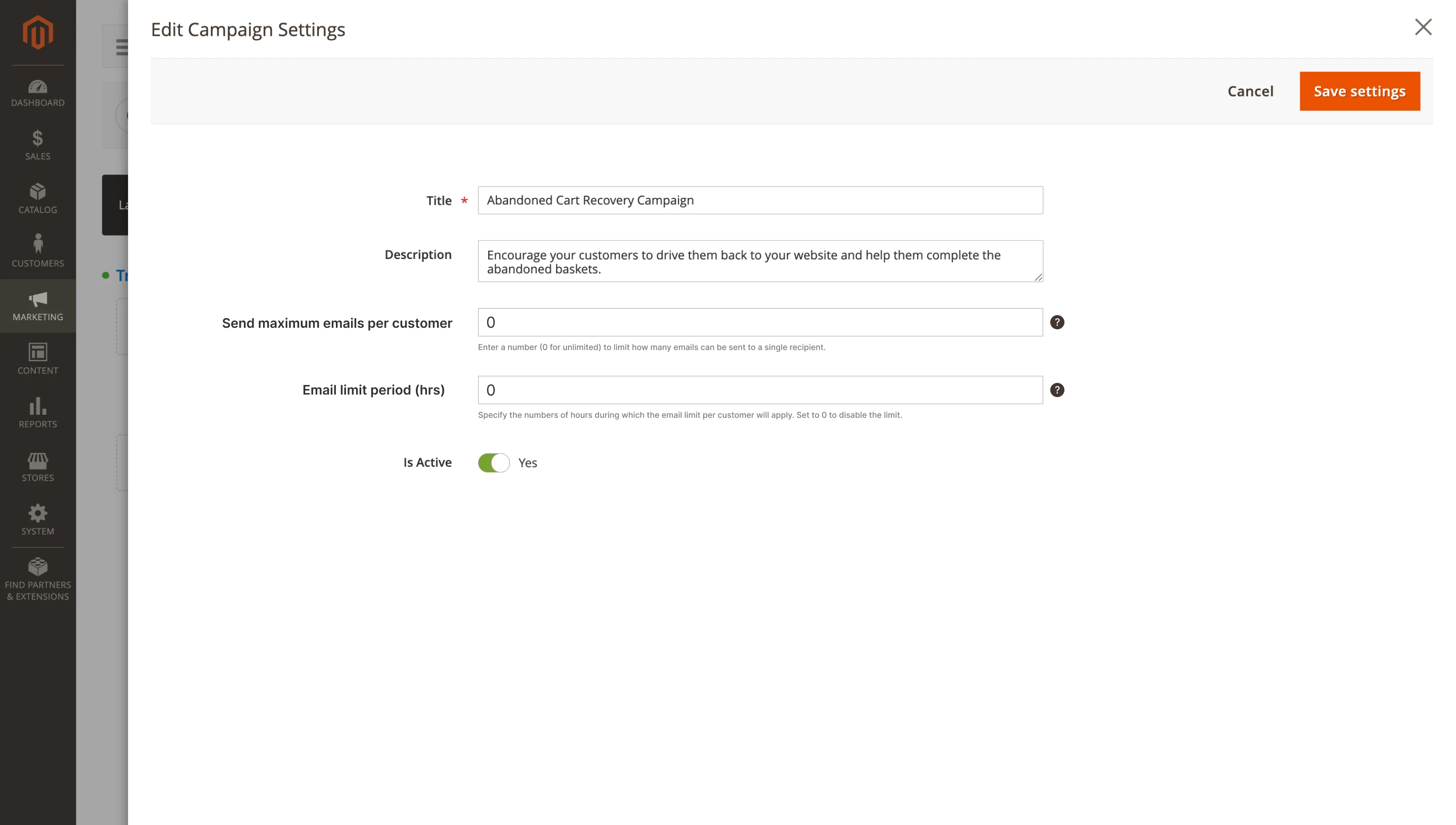
These limits help prevent excessive sending, so messages do not feel like spam. Settings at the campaign level let you control send frequency more precisely.
For example, for critical email campaigns where every message must be delivered, you can choose not to set a limit. Previously, limits were available only in the global Email sending configuration.
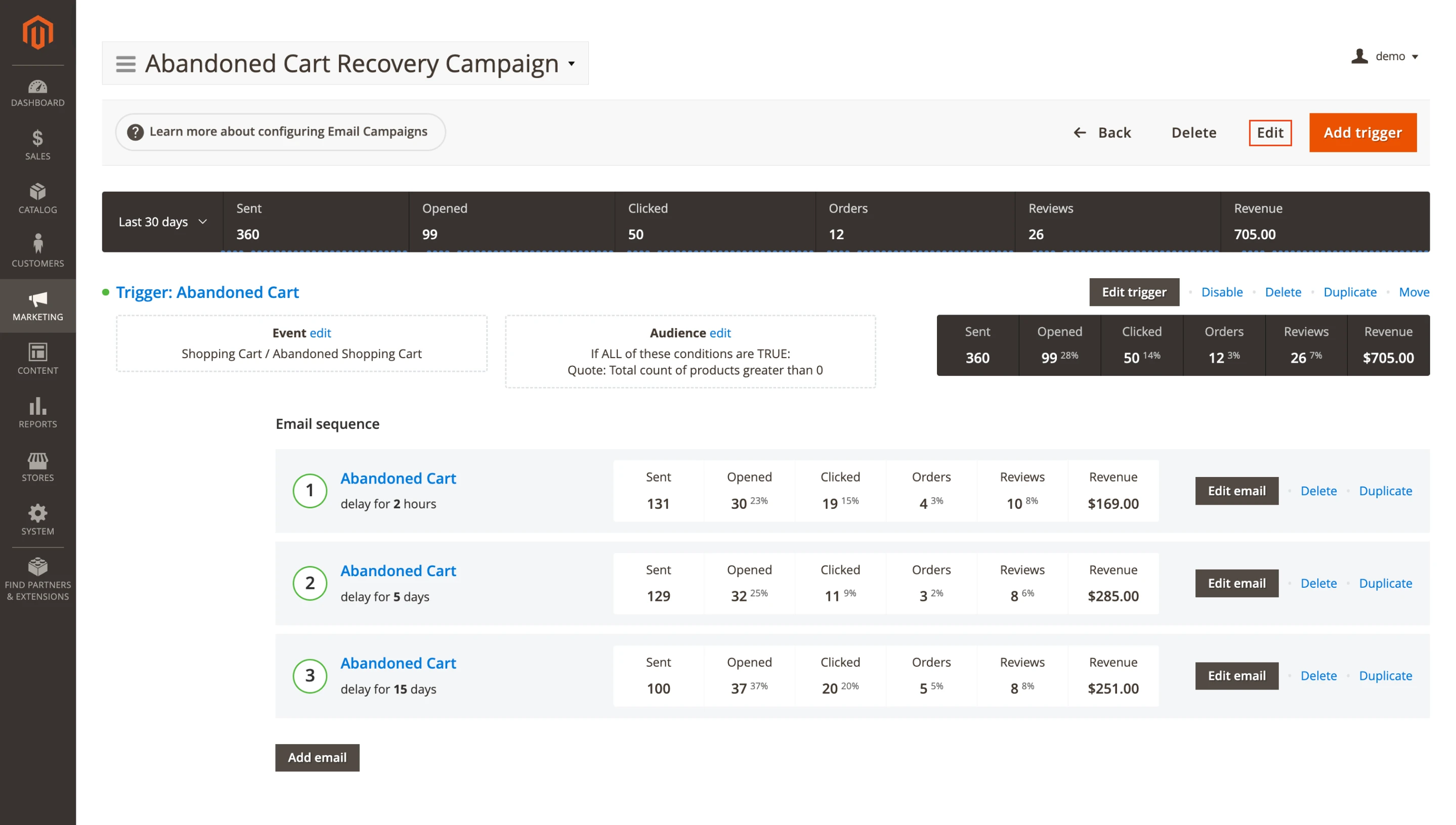
To use this functionality, open the required campaign: Marketing > Manage Campaigns > View campaign. Go to Edit campaign, then set the values in Send maximum emails per customer and Email limit period (hrs).
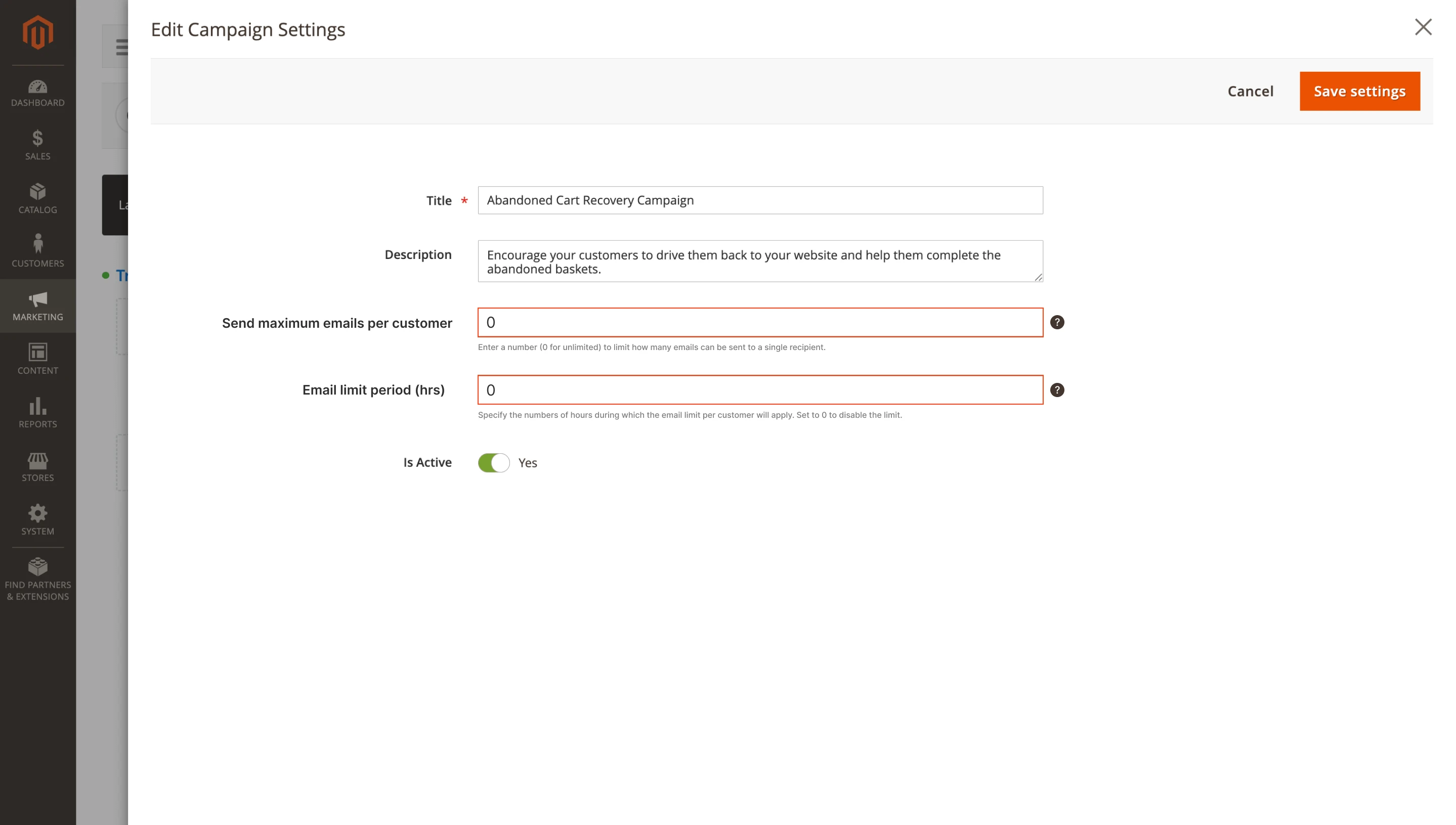
We've covered the key updates you can use in November. Try them out, and share your feedback on Magento 2 extensions pages.
Use this Magento 2 follow up email extension as an email marketing automation platform. It will send your marketing emails to all the right people at the right time, and will motivate your customers to take the next step in your store.
Blog MX is a fully featured blogging suite. It's a perfect way to provide your customers with valuable content, boosting your store's search rankings and driving precious organic traffic your way.
Magento 2 store loads quickly only if its pages are in the cache. Our extension automatically adds pages to the cache and thus, speeds up your store!
Whenever your customer or Google visits a page, its most recent variant will be loaded in a fraction of seconds from the cache.
This extension introduces a unique robot designed to monitor cache status. Once the cached page is cleared, the robot visits this page and warms up the cache for it!
A well-designed blazing fast search in a store will increase its conversion rate and revenue growth.
The Elasticsearch extension provides a multifunctional in-store search system that returns relevant results within milliseconds.
Provide great search results to your customers, and give them incredible experience, so that they could find and buy items they want much easier.
Customer segmentation is one of the central principles of marketing.
The Magento 2 Customer Segment extension allows you to split customers into segments according to the rules and then use them in other extensions.
It allows merchants to use communication channels with customers in the most effective way. Also, it will decrease the financial resources needed for marketing.
This module is an incredible enchancement to your store's usability. It improves upon every aspect of layered navigation: performance, product filters, and visual customization.
It also lets you add standalone brand pages, an "All Products" page, and offers the ability to retool your category pages for infinite scrolling.
The Layered Navigation extension will take your store's usability to the next level!
In-store promotions in Magento are an important tool for increasing sales. They catch users’ attention, motivate them to buy otherwise unnoticed goods, and purchase more items in one order.
Magento 2 Shopping Cart Rules extension gives you several types of new special promotion rules and shopping cart conditions. It also has a smart notification system for possible discounts.
The Magento 2 Product Kits module lets you create product bundles for customers to complete. Urging them to buy the entire kit instead of a single product is a great way to increase your average order value.
It expands on the default Magento functionality in so many ways that you'll never want to go back.
Discover a revolution in content generation with our AI Assistant. It integrates directly with Magento 2 and works with OpenAI (ChatGPT), Anthropic (Claude), and Google (Gemini) to create product, category, blog, and support content in minutes.
Advanced Reviews for Magento2 is a powerful tool that makes review section in your store more structured, informative and authoritative.
As a comprehensive Magento reviews extension, it refines user engagement and propels customer satisfaction.





